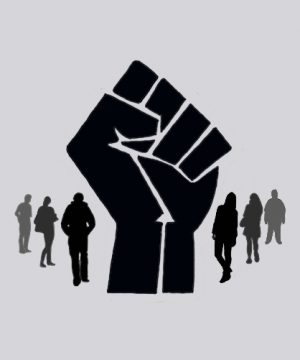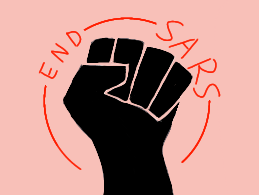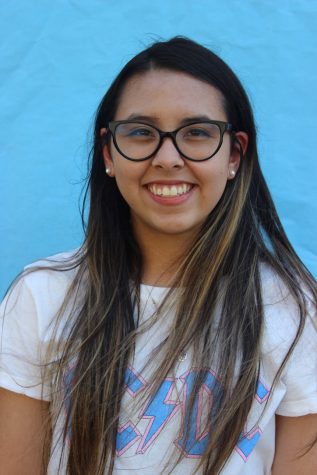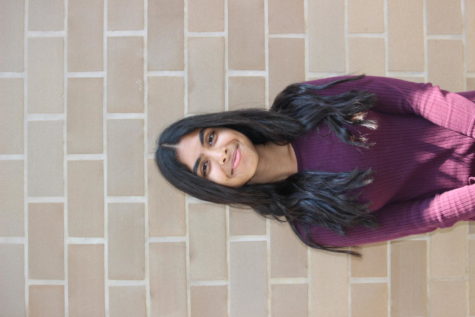True crime genre reflects similar systemic inequities of America: varying perspectives and stories
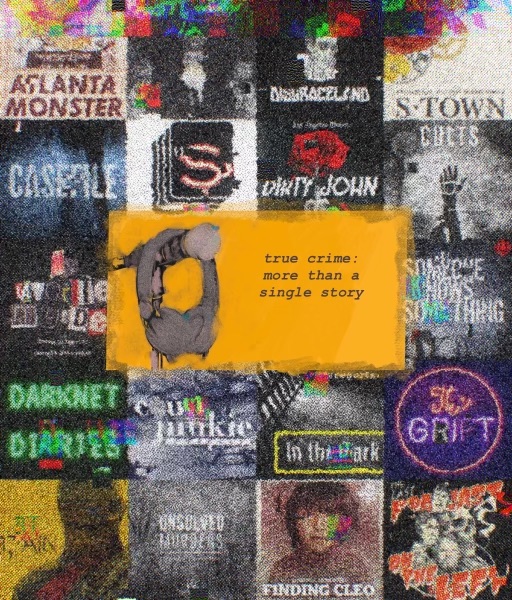
America has a problem with systemic inequities, especially when it comes to those in marginalized communities. The true crime scene is no exception.
May 4, 2021
TW: This article contains mentions of violent crimes and graphic content that may be disturbing for some. Reader discretion is advised.
Media consumes everyday life from every angle: social media, reality TV, the 24-hour news cycle, documentaries, streaming services, you name it. True crime is one of those media forms, somewhat its genre. America as a whole retains an audience fascinated by the gory and graphic details of violent crimes, murders, assaults, the lists go on.
However, America has a problem with systemic inequities, especially when it comes to those in marginalized communities. The true crime scene is no exception. It’s not new for people to turn their lives or others’ lives into media forms, possibly for self-expression, to bring awareness to something, for a laugh, or even for profit.
But what about the subtle bias present when a rich, white, straight man goes missing, and all resources are activated in no time when a person of color’s family can’t get the police to take the missing person’s report because “they haven’t been missing for long enough?” Lauren Mattice at the Daily Trojan emphasizes how marginalized groups are overrepresented “in serial killer-victim statistics and case ignorance. Around 13% of the U.S. population is Black, 17% is Latinx, and respectively they comprise 24% and 7% of these victims.”
Avid true crime follower and host of Podcast Central Anu Maddali, a senior at Quarry Lane High emphasized that she has “been trying to find more podcasts focusing on colored people, since I feel there is not a lot of coverage on those.”
It’s almost as if people have become desensitized to sensationalized stories without seeing the more significant call-to-action and humanity behind it, even more so when people don’t see themselves in the story. People heard the headline: “19-year-old college student Faith Hedgepeth found mutilated in her apartment,”but failed to have a more extensive discussion on her Native American background.”
Hedgepeth was a member of the Haliwa-Saponi Native American tribe recognized by the state of North Carolina. Erik Oritz from NBC News reported that a “new report documents more than 2,300 missing Native American women and girls in the U.S., underscoring the reasons behind the lack of awareness and scrutiny in these cases.”
As a whole, it’s been noted that mainly white women are consumers of true crime and at the front of conventions like CrimeCon. But why? Well, people like to see themselves reflected. Bre Venanzio, on her Medium page, notes how “our culture, our media, has always been fascinated by dead white women, even though black women are far more likely to be the targets of violent crime.”
Just look at Samuel Little, coined by the FBI as “the most prolific serial killer in U.S. history.” Unless you are a part of the true-crime community and take the time to look for stories, his name isn’t well known like JonBenet’s case.
This is because he primarily killed black women, specifically Black and Latinx sex workers. Fast forward to today’s world, Breonna Taylor, a Black woman, was killed by three Louisville Metro Police Department officers while she slept in her bed. People fail to recognize that following true crime blindly means taking how the police treat you in the world for granted. It’s nearly impossible to separate police work from true crime, as most of the content revolves around investigations.
It’s one thing to be a part of the true crime community, like any other cultural genre. It’s another to fail to acknowledge your privileges, seeking out the cases that don’t make headlines, and Netflix hasn’t picked up yet.
Us (Shereen and I, Daniela) are avid true crime listeners. Here is our take on America’s bias and inequities within the true crime community.
Daniela’s perspective: why go looking for danger when living in society alone is dangerous enough?
It should come as no surprise to anyone who knows me; I have many core interests, and when I dive into them, it just becomes me swimming through an ocean of knowledge and stories. No matter how scary it is on the surface, I’ll dive in because I want to explore. I know it’s ironic; I hate horror movies; however, I love anything true crime related. But I wouldn’t say I like it for the expected reasons, at least the ones I’ve seen online.
I will acknowledge that sometimes I enjoy true crime because it pulls me in, intrigues me, distracting me from reality more than any fiction book could. However, that’s not the core reason. I started listening to true crime during my sophomore year of high school when I was introduced to the concept of podcasting in Journalism one.
I wanted to find an example of a good podcast; no one told me what podcasts were. My mom told me the podcast app was a button I shouldn’t press because it had a microphone on it, and she said it was some recording social media platform. Upon later questioning, no one around me knew what podcasts were.
Nevertheless, I was led to Serial, and I became hooked immediately. There were tangible examples of racism, stereotyping, failures within the criminal justice system, things I’ve heard about and have my own stories about. But you never really know it all, no matter how many experiences you have had in your life. There was something so special to me about exploring the stories of others’, even if it was dark and grim. You can read a Wikipedia page or a single news story about a true crime incident, but rarely are the stories ever focused on the victim and the circumstances around the crime itself.
I admit, sometimes it’s a lot, and I take a break to regather myself. It’s essential to know your “stamina” for content like true crime. Jooyoung Lee, an associate professor of sociology at the University of Toronto, emphasizes that “any time you’re exposing yourself to extreme violence, you always run the risk of potentially traumatizing yourself. People have to be aware of that and listen to their body’s reactions to these kinds of series.”
I often go down a google rabbit hole of “can cell towers be used as actual evidence?” or “how much history does the Los Angeles Police Department (LAPD) have of misconduct and police wrongdoing?” Sometimes looking up timelines of some instances can lead me to contemplate how much the world has progressed or fallen behind. My brain is a database, absorbing info that clicks with the things I want to change, the person I want to be, along with rejecting information that doesn’t intrigue me. I guess everyone does that. But what good is it if I don’t use the information to change my own biases and try to reshape the narrative to support minorities?
It’s not new that white women are some of the prominent people consuming and producing true crime, but that stumped me when I realized that. I am partially white but still a mixed Latina. I have my fair share of privileges, but not exactly all the same privileges as an entirely white person. I’ve never seen these shows as just a source of entertainment: I’ll go to Youtube for dog videos when I need that.
Another avid true crime listener, senior Misha Caternor from Longreach High, explained how there are both black serial killers and black crime victims, however much coverage is focused on emphasizing stereotypes that already exist and are harmful as is. Many content creators and members of the media “only focus on black serial killers” in other words, simply the angle of coverage has the potential to further false racial perceptions.
Maddali spoke on how “a lot of mainstream true covering podcasts don’t focus a lot on colored people and their experiences,” discussing how the way Native American cultures treat trauma and anything that could look negative potentially impacting people sharing their stories in the first place.
“I think the thing with a lot of minority groups is when it comes to traumatic experiences, it is taboo for a lot of minority groups to even acknowledge it.” The world sees these things as something “we did something to bring this upon ourselves” which is not the case, Maddali explains, using the word “shameful” to describe such.
This honestly made me think and reflect on my culture. Latino/a families are generally pretty strict about where you are, who you’re hanging out with, and prioritizing family. I have never been to a sleepover, been told from that no one has good intentions, and been taught that camping and hiking is stupid (why go looking for danger when living in society alone as a minority is dangerous enough?) It makes sense.
For example, my phone died one time when I was out shopping. I charged it as soon as I got back to my car, my family almost called the police and reported me as a missing person because I was unreachable for 15 minutes. It’s a little maddening when my friends can just go hang out with other friends without it being a big deal, but the overprotectiveness comes from a place of love that’s cultural and caring. When you’re any kind of minority, life can be scary. Your head is constantly on a swivel with your guard up, in the same way that women take self defense classes to avoid being victims of sexual assault, almost as a collective preventative measure (yes, I take jiu jitsu classes, as well).
I get it, being a woman and Latina already leads to stereotypes I didn’t ask for. People tell me “you’re smart for a Latina.” It’s exhausting when the only “you” in the media is either the maid or some hyper-sexual straight woman. Jeez, I’m a scorpio but I’m not “feisty.” My mom would tell me stories of times men cat-called her in the streets, no wonder asking if I could go to a sleepover is the equivalent of asking a white parent “Hey, can I go do some drugs with my friends?” Non-minorities don’t have to live with this lens, hence don’t have to live with any protective filters, and as a result, are more open with their stories and feel more able to share others’ stories. Minorities are already alone in their experiences; it’s just natural to pretend everything is okay and keep going, hiding the scary stories under a bed that’s bound to go unheard for years.
This is why I always come back to true crime stories; I can’t stand the thought that there is a victim whose story they cannot tell, even more so when it’s someone who is a minority. Society already assumes that marginalized groups are less valuable and less deserving; such only gets worse when combined with the worst of humanity. Who am I, if I silence or don’t listen to the stories of people who share similar identities as me? There is no way to make substantial societal change without being a well-informed intersectional empath.
Shereen’s take: we need to do better as a community to support POC
In middle school, I got a chance to take elective classes such as Art, Culinary cooking and Computer graphics to further my interest in subjects I find intriguing. What did I find fascinating? Gore. So I decided to take Forensic Science.
This class had it all, but one thing this class made me realize the most is how often crime happens in this country. I remember thinking to myself on the last day of school, how “we need to have special forensic doctors and Federal Bureau of Investigation (FBI) agents as jobs to track people down doing bad things since there are so many of them.” This led me to my crazy obsession with serial killers and unsolved cases. I followed every step of the JonBenét Ramsey case, jotting it down to the core while tracking down all of Jack the Ripper’s victims, searching for motives.
Eventually, I stumbled across true crime podcasts; I talked to Daniela one day when she had introduced me to them. I have never stopped listening to them ever since.
My favorite one? Hands down, Crime Junkie. Hosts Ashley and Brit do a fantastic job hosting this show by describing what happened in the crime very objectively. One thing that stood out to me, like Dani, was how the media always focused on the crime itself rather than the victims; Crime Junkie changed that narrative by going into great detail about the victims and treating them like who they are: humans. People who had a life to live before this have crime instead of just a name.
If you decide to listen to true crime podcasts, I must warn you it can be a little brutal at times, as the host members describe brutal incidents in detail. It can also be emotional, and podcasters may put trigger warnings into place; some podcasts talk about LGBTQ hate crimes, discrimination, physical, sexual and verbal abuse, domestic violence, race hate crimes and many more. This is the world that we live in; ignoring reality makes these problems worse and the only way to change these things is to start by listening to these stories.
True Crime Podcasts made me realize one thing: we need to do better as a community bringing justice to people of color. I listened to so many cases in which Ashley, the host, said one primary thing: “since they were Black, the police did not look much into their case.” Those words hurt — the families of people who did not receive the justice they deserved solely because of their skin.
What you would think is common sense sometimes seems to not exist in the world of biased true crime coverage. Many minority defendants fall prey to victim-blaming, and it just isn’t right. Somehow, the color of your skin determines how you’re treated. Maddali discussed sometimes, people justify crimes by saying “this person did XYZ so they deserved this, or bring up stuff from the past.” One instance is the Dante Wright murder; “there is this tweet and a picture of him holding a gun to a child saying ‘this is the real Dante Wright.’ When white people exercise their second amendment [right] and have guns, it is not a problem. But when black people or people of color do, it is.”
Who you are, things you can’t change about yourself, shouldn’t determine how people treat you.
Being a Muslim has made my childhood one which not a lot of people want to endure. In third grade when I used to walk into class, some kids used to scream “Allah Akbar” as they made the phrase “please god” into an insult imitating the actions of those who are terrorists. Yes, my third grade classmates had indirectly called me a terrorist. Which comes to the point of where did they learn these things? Who taught them these things? The media did.
Podcasts, Online news sources, News Channels and others not only fail to bring light and justice to those who suffer by not reporting crimes on minorities but also fail to teach the younger generation on how to do better. Third grade students should have the knowledge to know what is permissible to be said and what isn’t. Because if they continue to learn such things, they develop hatred in their heart which is exactly what leads to hate crime to begin with.
Research is key. Reading the news more to make yourself more aware of the crimes happening in the area and to what race. Another thing I recommend is to look at victim lists and honor those who have not been honored by many, different races or not. It is our job as a community to look past the color of our skin, and to fight for the justice of those who have lost their lives due to a heinous crime.
Call to action: please, acknowledge your privileges and listen
Yes, everyone, minority or not, has their own baggage, experiences and struggles. One might argue that you can’t really track experiences, they are all subjective anyways. Nevertheless, statistics don’t lie. The APA (American Psychological Association) published their findings on trauma and PTSD in ethnic minorities. Racial hate crimes are highest among African-Americans at 62.7%, followed by Latino/as at 47.4%. Physical assault, although rates vary depending on gender, Native Americans/Alaska Natives have the highest rates at 61.4% of women and 75.2% of men, then multiracial individuals at 57.7% of women and 70.2% of men, African-Amerians at 52.1% of women and 66.3% of men, lastly followed by Asian/Pacific Islanders at 49.6% of women and 58.8% of men. New research developments have found that “ethnic minorities are exposed to higher rates of trauma and are less likely to receive adequate mental health treatment due to service barriers and the lack of culturally informed treatment providers.” Trauma in ethnic minorities has been connected to delinquency, aggression, truancy, binge eating, substance use, suicidal thoughts, risky sexual behavior, depression, psychotic symptoms and anxiety. Without the ability to speak out in a safe way, because of cultural attitudes and whatnot, the harmful cycle continues.
The APA also published their findings on trauma and PTSD in LGBTQ indiviuals; “LGBTQ indiviauls are twice as likley to experience hate crimes as compared to any other minority group” according to a 2011 FBI report. In 2015, “there was a 20% increase from the year before in the number of hate and violence-related homicides of LGBTQ and (Human Immunodeficiency Virus) HIV infected individuals.” Historical trauma is defined as “massive group traumas that an individual is exposed to over the span of a lifetime and across generations”; the Orlando Pulse Nightclub massacre, the murder of Matthew Shepard, and the assasination of Harvey Milk are a few. Lesbian, gay, and bisexual youth are “four times as likley to attempt suicide,” and this statisitc increases when families reject their identities. The Trevor Project found that “youth are 8.4 times as likely to attempt suicide as compared to LGBTQ peers with low or no levels of family rejection.” When it comes to transgender and gender non-conforming indivuals, suicide rates increase to 42-46%, and gender-non-conforming students “who are victimized are at greater risk for developing PTSD later in life.”
Shereen and I know that there is only so much we can do and say to encourage people to truly understand how the true crime genre is a mirror of society as a whole. We understand that these stories may be upsetting, graphic, even triggering for some. However, remember that being able to block out someone’s story because it’s scary is a privilege on it’s own. Air on the side of caution, this is not a time to compare traumatic life experiences and resort to some kind of “trauma olympics”; this is more invalidating than supportive. Everyone processes in different ways at different paces, so posing hypotheticals like “well if they weren’t at that place that night, they wouldn’t have gotten murdered” does no one any good. Don’t victim blame, you never know how you would react in a certain situation until you are in that situation itself. If you find yourself doing these things, it’s time to reexamine your biases and social worldview; listening is one of the most important things you can do.


